|
Rory Miller is an interesting character, a self-defense expert who has written some thoughtful books on violence: how to avoid it, deescalate it, or—if it is unavoidable—how to emerge as uninjured and safe from litigation as humanly possible.
He’s no “stolen valor” case, standing in his author photos in his blackbelt and karate gi in front of some strip mall dojo trying to impress you with his pose of badassery. He’s got decades in corrections, in everything from intake to extractions (donning protective gear and shields and storming cells). Somewhere in there he found the time to serve in the National Guard as a medic, in combat, in addition to training Iraqi corrections forces. I hope I don’t offend him when I say this, but in active duty we called the Guard “weekend warriors,” because there were such large gaps in their training cycles and service times. But that’s what made their jobs so much more dangerous when they were in-theater. Regular Army soldiers drill, drill, drill. Guardsmen work, live, get called up, drill a little bit, and then get thrown into the thick of the shit. But that’s another topic for a different day. Returning to Mr. Miller, notice I didn’t call him a “violence expert.” Neither (I think) would he ever apply that term to himself. Why not? Well, because, due to the nature of violence, a “violence expert” would be a contradiction in terms. One cannot be an expert in something so chaotic, so full of passion and confusion. Something so mutable. Weird shit happens in combat, both the staged variety (contact sports) and in the real thing. I saw a boxing match once in which a boxer was hit in the jaw, lost his mouthpiece, hot potatoed the piece from gloved hand to gloved hand, and actually caught it. One of the two commentators, Andre Ward, said he’d never seen anything like it. And Ward had been involved in boxing since childhood and retired undefeated, having not lost since he was twelve years old in the junior Olympics. In that time he had seen pretty much everything a boxer might see, every style and slick feint, every toe-stepping, elbowing, eye-gouging dirty trick in the book. But pretty much everything is not everything. It’s hard, perhaps impossible to think in the midst of violence, aside from in the most limbic and primal sense of muscle memory. As superlative boxer “Sugar” Ray Robinson once said, “You think and you’re dead.” It’s not just that violence is so immune to analysis and understanding, though, nor that it clouds the faculties of even the most analytic or philosophical. It’s ultimately that the learning curve is too steep for one to gain knowledge without sacrificing too much (like limb and eventually life) in exchange for the experience which might lead to technical mastery. You don’t need me (or Malcolm Gladwell) to tell you that if you want to get better at something, you need to do it as often as possible. You want to learn to play the guitar, you start plucking the strings. For awhile you wince on the disparity between the sounds you produce and what you hear in Stevie Ray Vaugh solos. Meanwhile, your neighbor in 3B makes it even harder to learn, pounding your floor-his-ceiling with a broom handle. He adds even more dissonance to the general cacophony by making various threats against your dog as well as several unprovable insinuations about your mother. You are suddenly faced with a choice: either continue through your wincing and the neighbor’s brooming until those harsh sounds become songs, or take that once-cherry axe down to the pawnshop and try your callused hands at something else. How do you train with violence, or practice it in a safe way? Sure, you can spar with a friend, practice on a dummy, or read a manual. But just as the map is not the territory, sparring a friend with headgear is not the same thing as streetfighting a guy on PCP trying to disfigure you with the jagged glass shards of what was once a beer bottle. If every time you plucked a guitar string, you risked losing a finger (even if the risk was infinitesimal), you might be tempted to give up the guitar and try tickling the ivory; there, at least, you’d only have to worry about the heavy wooden fallboard clapping shut on your fingers. Combat sports are not combat, but even there the gulf between theory (sparring) and praxis (fighting under hot lights in front of a screaming crowd) is wide indeed. Boxing even has its own version of the map-contra-territory maxim. “Everyone has a plan,” Mike Tyson once observed, “until they get punched in the nose.” People who’ve dealt with violence often understand as much. As do astute artists who write about violence or depict it in films. Good movies and literature are rife with examples of this. Think of Anton Chigurh in No Country for Old Man. He’s an implacable black-eyed killer, whose odd denim suit and weird pageboy haircut only add to the unsettling surreality of the man. And that’s before you factor in his choice of weapon, the captive bolt stunner that hisses like some impossible-to-taxonomize snake. He uses it to blow holes in doors, human heads, and anything else that either gets in his way or earns his ire. He does quite a bit of killing in No Country, and proves resourceful enough to do everything from escaping police custody to tracking a man across the open range. Yet it all comes crashing down for him in the end—when he gets t-boned by a car at a four-way intersection. And it’s not even a very sexy car that wrecks his universe and turns him into a bloody, staggering mess. It’s just some old wood-paneled station wagon. The caprice of fate, its randomness, has caught Chigurh with a car just as it previously caught his potential victims with that coin he liked to flip. Another great example of this is in Larry McMurtry’s Lonesome Dove. I resisted reading the book for years. Mostly because every time I caught scenes of the movie on TV, it looked like the standard romanticized view of the West you see in Hallmark productions, about love blossoming between ranch hands and widows walking hand in hand against a backdrop of chestnut criollo running off into painterly sunsets. But the book is a hell of a lot different from the movie. There’s a scene, near the end of the book, when the cattle herders have almost completed their arduous trek from Texas to Montana. Montana’s God’s country, with all the wonder and fury that implies. It’s rough, but the men, well-seasoned in previous range wars and cattle raids, are up to the challenge. One of the saltiest and smartest of the lot is Deets. Deets is a black cowboy with a savvy for navigating land and reading weather patterns and other omens. He’s so good that even the most bigoted, racist cowpoke has to tip his hat to the man and acknowledge not just his handiness, but his supremacy in a few areas. And yet Deets is finally killed by a young Indian boy, not even a brave, just a runty tintype who’s trembling with fear when he does the deed. The West was pretty much won at this point (from the White perspective). Indians were mostly drowning their sorrows over their shameful conquest on the res, sacrificing dignity by appearing in various medicine shows, or collaborating with whites as trackers and guides. And yet this boy spears the seasoned old cowboy, a veteran of various range wars and cattle disputes, as much due to confusion and fear as anything else. Sure, Deets had let his guard down by indulging in an ill-advised show of compassion, rescuing a swaddled baby, abandoned in his papoose by a squaw who took off at the first sight of the palefaces and their buffalo-maned black guide. In the scene (perhaps the most moving in a truly affecting epic tale), Deets is holding the baby out to the young, quaking wannabe brave, who rewards the black man’s noble gesture by skewering him clean-through with his flint-tipped spear. There’s a poignancy to the miscommunication, but also the sowing of the seed of a smoldering rage that explains how people can go from having good intentions to engaging in war crimes. Human nature’s always mutable, even when it seems fixed. And nothing can make it come unstuck faster than violence. What the hell kind of “expert” (in violence or anything else) could have predicted such a random, ignominious death for the skilled and battle-tested specimen that was Deets? You can mitigate the risks, but ultimately violence is a well you don’t want to go to unless you absolutely have to. I’ll shut up now and just let Old Bull Lee have the last word: No one controls life, but anyone with a frying pan controls death.
0 Comments
FIDDLING PAST THE GRAVEYARD: A GREAT HORROR MOVIE THAT WILL PROBABLY NEVER GET MADE The fourth “Dead” movie in George A Romero’s “Dead” series (is it a sextology at this point?), Land of the Dead, is probably the last one worth seeing. It’s not as good as the groundbreaking Night and can’t hold a candle to the scathing, blood-soaked satiric masterpiece that is Dawn. It occupies a place similar to that of the third film in the series, Day of the Dead, which, while nowhere near as revered as the first two Dead movies, is at least a respectable entry in the canon. Day even has some defenders who claim it’s the best in the series. This group, while small, is a vocal and probably growing contingent in the world of Dead fandom. Land of the Dead’s action centers around Pittsburgh’s “Golden Triangle,” the downtown area which still shows enough of its granite-parapeted legacy from the Carnegie-Melon endowment days to give the skyline a slightly medieval cast. The Golden Triangle is surrounded by barbed wire and all manner of fortifications, defended by well-armed guards who dispatch any zombies that wander too close to the settlement’s perimeter. Occasionally some of the more adventurous (or bloodthirsty) humans conduct convoy operations outside the wire, using an uparmored behemoth called Dead Reckoning to offset the numerical disadvantage they suffer in the face of the shuffling zombie hordes. The parallels with America’s quagmire in Iraq are hard, perhaps impossible to ignore, even after giving that most meager summary of the movie’s plot. By far the most interesting part of the movie is the high-rise at the center of the Golden Triangle. Known as Fiddler’s Green, it’s a sort of fortified retirement community where the upper echelons of post-zombie apocalypse Pittsburgh congregate. The nature of life there is only obliquely hinted at in a series of advertisements touting the colony’s numerous amenities available to anyone lucky enough to be selected to live there. Fans of George Romero’s zombie films have noted that their most interesting aspect is how they focus on the humans turning against each other even as the zombies try to claw their way within reach of their warm-blooded quarry. Something about the abiding enmity between groups of humans (even in the face of supernatural horror) strikes a nerve with audiences, even if they can’t quite say why. It also probably puts the lie to President Reagan’s old hackneyed saw that, were alien invaders to descend to Earth, we would all be united under the banner of homo sap to fight for our common good. It’s much more likely that if aliens were to land, mercenary humans would hide in alleys and film the bulb-headed greys dematerializing several people with their death rays. Then they’d upload the footage online. Either that or they’d wait for the flying saucers to disappear over the horizon before running out into the open to loot anything not reduced by plasma canons to scorching cinders. EMP blasts would take care of any pesky security and automatic lock systems guarding the various big box stores and malls spread like a blight upon the landscape. Pretty soon shopping carts filled with appliances and videogame systems would be seen rolling over streets covered thickly with charred corpses. Why didn’t Romero focus more of Land of the Dead’s action in Fiddler’s Green? Sure, the broad satire of American misadventure abroad is more than enough to sustain the interest of the cerebral gore fan. But it seems that the story, the tension, would lie as much between the residents of Fiddler’s Green and the humans below, rather than between the raiders and the zombie hordes. To give Romero credit, some of this tension is explored in the film, via the relationship between Cholo DeMora, played with manic viciousness by John Leguizamo, and Paul Kaufman, played by a relatively sedate, even bureaucratic Dennis Hopper. Cholo is one of the more able raiders who goes outside the wire in the uparmored vehicle. Kaufmann is the plutocratic ruler of Pittsburgh who, despite perceiving Cholo’s usefulness, still balks at admitting him into the stratosphere where the postapocalyptic Brahmin frolic and wile away their days. But we never really get more than a peek behind the curtain at Fiddler’s Green, which is all the more the pity. And this is because (it occurs to me now) the real point of conflict in Romero’s films, especially in Dawn of the Dead (the best in my opinion) is between the humans and their own consciences; their doubles as it were. For a Fiddler’s Green movie to truly work, we wouldn’t even need to see conflict between the residents in the tower and the renegading humans below; at least until the film’s denouement (a la the showdown in Dawn between the roving biker gang and the four humans holed up in the Monroeville Mall). Recall that in Dawn, after the zombies are locked out of the mall, the people inside set about gorging themselves. They gorge themselves both literally on food, and in acts of sensory overload (with videogames, ice hockey, and all manner of diversions), enjoying the good life to the extent they can. And yet the horror waiting just on the other side of the mall doors, as well as the reality that most of humanity is dead, plagues them. It’s the wretched excess, the pleasure palace turning into a prison, which is the most fascinating part of the film, and which honestly pushes it from the realm of horror into the genuinely speculative. Someone (I forget who) pointed out that the Dead films function for horror fans the way Dune does for SF fans, or The Lord of the Rings does for fantasy fans. Romero didn’t just create a story, but a universe. There’s a sense that the characters in Dawn inhabit a sort of open-ended landscape, a “sandbox” as the gamers call it, in which three-sixty exploration could take place. You could make a tabletop game from the Dawn film, or for that matter a pen and paper RPG (maybe someone already has). It’d be unfair to ask Romero to capture lightning in a bottle again with his fourth film in the series; or to ask a man already in his late sixties (?), well out of his creative prime, to rise to such a challenge. Romero was playing with other peoples’ money after all, more than he’d ever had at his disposal before. To make an essentially experimental horror movie, in which almost all of the horror is implied, would be a gamble on a par with Stanley Kubrick’s 2001: A Space Odyssey. Incidentally when the initial returns came in for 2001, it looked as if it would in fact destroy Kubrick’s career. But it would also be churlish to begrudge us fans the chance to imagine a movie that took place entirely in Fiddler’s Green. How might the action (and drama) progress in this kind of mockery of Elysium or Cockaigne where all pleasures eventually became poisonous, except maybe for the most hedonistic and soulless of residents? I’d hazard it would be a bit like a postmodern version of Roger Corman’s adaptation of Poe’s The Masque of the Red Death. The wealthy and more fortunate would try to console themselves in their hall of mirrors (or their skyscraper of mirrored glass). They would suppress any pangs of conscience, or fears about mutiny from below with daylong orgies and mountains of whatever drugs might be available. Overdoses would be common, as would suicides (there’s actually a suicide inside Fiddler’s Green in Land of the Dead). Perhaps, as in our world, some of the disaffected offspring of the privileged would try to find common cause with the rabble outside the walls. The only question would be if they would sympathize with the raiders or with the zombies themselves. My guess is that the sympathy of the disaffected children of privilege would leapfrog the raiders and Golden Triangle guards, and lie with the starving hordes of the undead. The raiders, after all, are martial, militant, reminiscent of police or paramilitary forces used by rightwing dictators to defend the status quo. The zombies are true outsiders, “othered” by a system that literally excludes them both geographically and even from the category of human. They aren’t just refugees exiled from the land of plenty, but creatures condemned to the outer darkness of living death. In the same way that extreme ecoterrorists are willing to use violence against fellow humans to make their point, there might be rich kids willing to allow themselves to be devoured by the zombies in Saturnalian acts of protest. To paraphrase antiracist activist professor Noel Ignatiev, treason to the warm-blooded is loyalty to the as-yet unrealized brotherhood of the living and the dead. Of course, some of the rabble would have to be granted admittance to Fiddler’s Green, if only provisionally and as day laborers. But there would also have to be an intermediary class, a sort of praetorian guard, or at least a force of Pinkertons, perhaps even Stasi-esque agents. These agents would have a bit more polish than the raiders, would have the taste to abstain from smoking or putting their feet up on the conference table when jawboning with the Committee inside Fiddler’s Green. It would be their job to monitor sympathies, loyalties, and general morale among even the elite within the Green (hey, there’s your title: Within the Green). The parallels with our misadventures abroad could even be continued as we followed life in this figurative Green Zone. Maybe the odd zombie might somehow inexplicably shuffle its way into the complex (snuck in by one of the rebellious young scions who thought they might make a performance art-like statement by facilitating a literal “eating of the rich”). The fact that all of this springs readily to mind shows that the potential does indeed exist for a movie or series to take place entirely within the Green. The roiling nightmare beyond its palatial façade would be suggested for the most part at first. But then the patina of normalcy within would slowly peel away to reveal the hideous truth that one doesn’t need to get bit by the undead to become a zombie...It would be a gory, guignol reiteration of Leo Tolstoy’s observation well over a century ago: “It is amazing how complete is the delusion that beauty is goodness.” I just checked Roger Ebert’s (R.I.P.) review of the movie and see that he was ahead of the curve (or at least this blogger). He recognized the untapped potential of a movie centering solely on the Versailles-like opulence which might not prove strong enough cynosure to distract the eye from the rivers of blood flowing just outside the window: “It's probably not practical from a box office point of view, but I would love to see a movie set entirely inside a thriving Fiddler's Green. There would be zombies outside but we'd never see them or deal with them. We would simply regard the Good Life as it is lived by those who have walled the zombies out. Do they relax? Have they peace of mind? Do the miseries of others weigh upon them? The parallels with the real world are tantalizing.” That prefatory bit about the [im]practical[ity] from a box office perspective explains why Romero would have balked at the idea of centering Land on the doings inside Fiddler’s Green, assuming it even occurred to him (and I think it did). It would require quite a bit of imagination and balls to pull it off. Balls and imagination Romero had to spare in the seventies, but which his fights with the studios had left depleted already in the eighties, to say nothing of the early aughts, when he finally made Land. And apparently I also lack the grey matter and testicular fortitude to try my hand at Within the Green, because I have yet to have a go at it, except in these idle musings. |
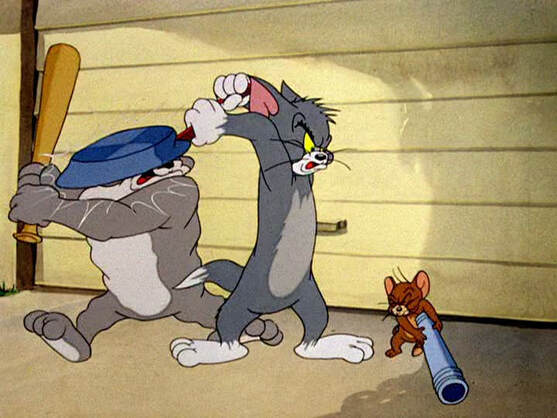
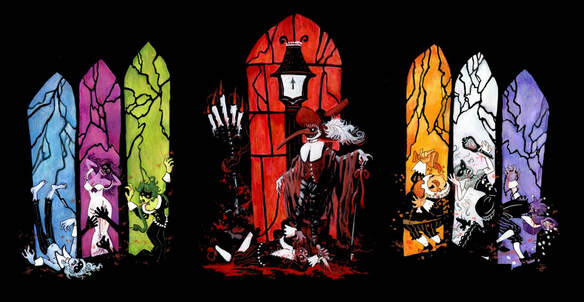
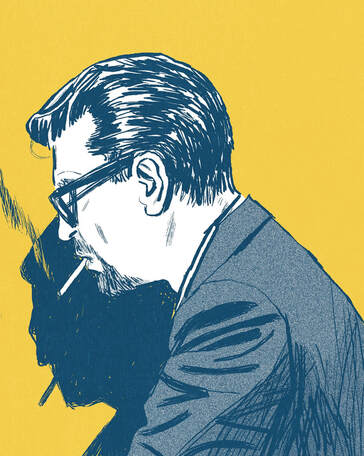
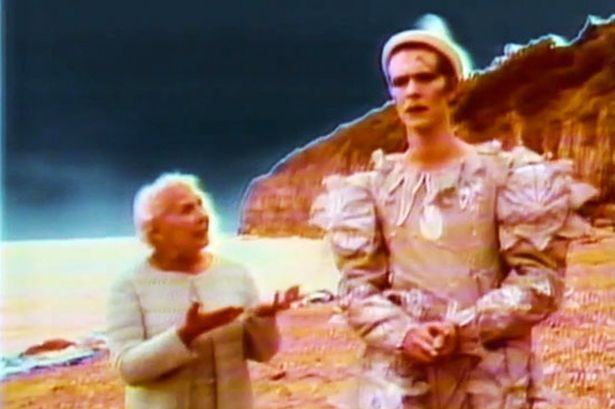
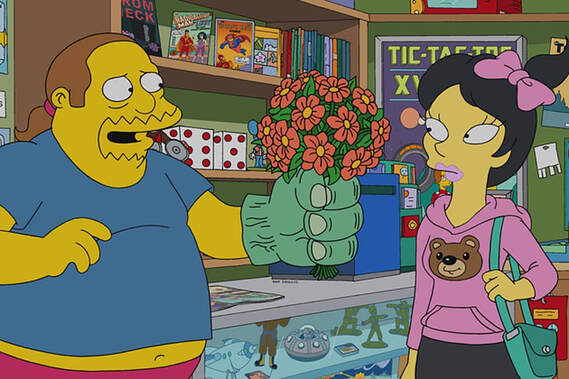
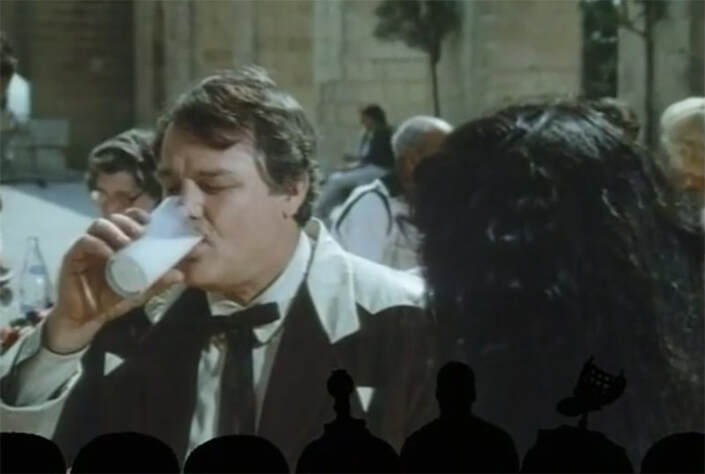
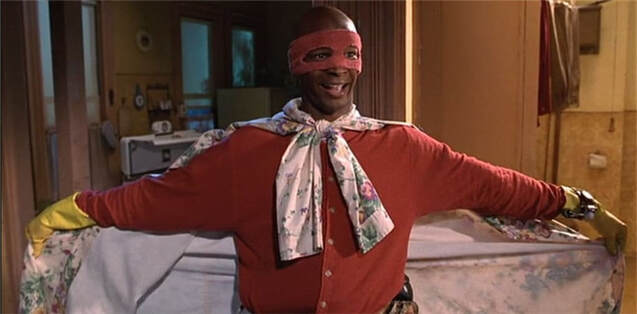


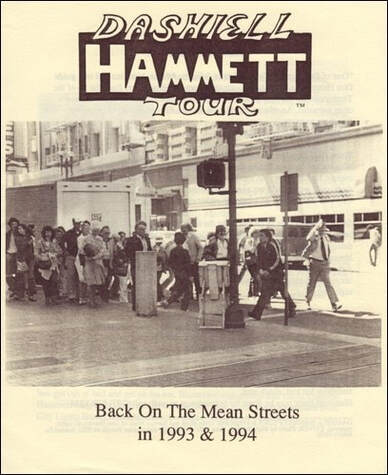
 RSS Feed
RSS Feed